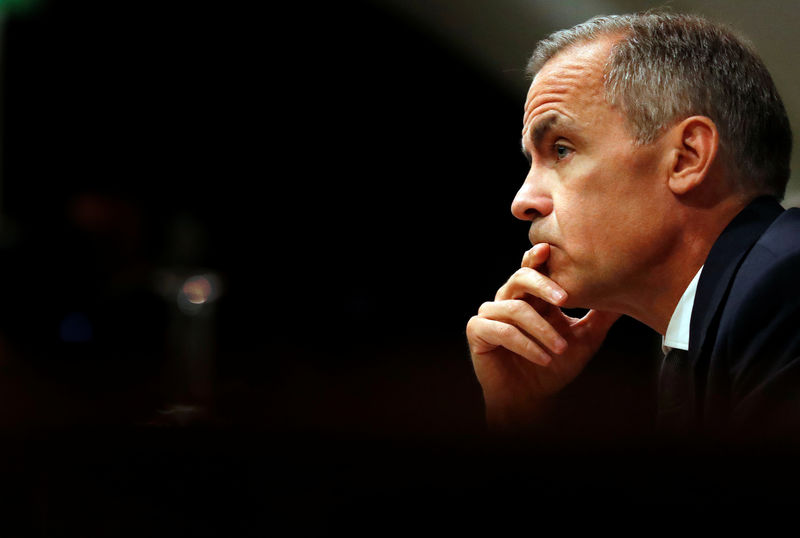By William Schomberg and David Milliken
LONDON (Reuters) - The Bank of England kept interest rates at a record low again on Thursday and cut its forecasts for growth and wages as it warned that Brexit was weighing on the economy.
The gloomier outlook for the next two years further reduced speculation that the BoE was close to its first rate hike in a decade.
Governor Mark Carney nonetheless sought to keep alive the possibility of one next year.
He said uncertainty about Brexit -- in particular lower investment by companies -- meant the economy could not grow as fast as before without pushing up inflation. So, just a small improvement in growth could bring forward a rate hike.
"The speed limit, if you will, of the economy has slowed," he told reporters. "That ... could have consequences for monetary policy, depending on the evolution of demand."
But investors saw no sign that the BoE was in a hurry to raise rates, a contrast to the outcome of its June meeting.
The pound hit a nine-month low against the euro and fell by more than a cent against the U.S. dollar. Shares rose and British government bond prices jumped.
Bets on interest rate futures suggested investors had pushed back their expectation for the first BoE rate hike by four months to December next year, RBC Capital Markets said.
Central banks around the world have struggled to wean their economies off the stimulus of rock-bottom interest rates, largely because of weak wage growth for workers.
The BoE faces the extra challenge of Britain's leaving the European Union, and its uncertain impact on Britain's economy.
Carney said "the assumption of a smooth transition to a new economic relationship with the EU will be tested" and he said investment levels in 2020 were set to be 20 percentage points below a BoE forecast before the Brexit vote.
His wary tone about Brexit prompted an angry response from a leading supporter of last year's Leave campaign.
John Longworth, a former head of the British Chambers of Commerce, said the BoE was resorting to "Project Fear" again, referring to what Brexit supporters said was a campaign to scare voters away from voting to leave the EU.
The Bank said it now expects the economy to grow by 1.7 percent this year, down from its May forecast of 1.9 percent and by 1.6 percent in 2018, down from 1.7 percent. It kept its 2019 forecast at 1.8 percent.
Faced with a weaker outlook, the BoE's rate-setters voted 6-2 to keep Bank Rate at 0.25 percent, in line with a Reuters poll of economists. That was more clear cut than a close 5-3 vote at the Monetary Policy Committee's meeting in June.
Since then one of the dissenters, Kristin Forbes, has left the central bank. Michael Saunders and Ian McCafferty voted again for a 25 basis point rate rise. But BoE Chief Economist Andy Haldane, who said in June that he was likely to back a rate hike in the second half of this year, stayed with the majority.
The Bank said it might raise borrowing costs a bit more than investors expect over the next three years.
But U.S. bank Citi said the BoE was probably more worried about the risks of a disorderly Brexit than it let show.
"Brexit downside risks are larger than the MPC can formally acknowledge, which keeps the bar for a pre-2019 rate hike high, in our view," analysts at the bank said in a note to clients.
The Bank kept its asset purchase programs unchanged on Thursday. It also said a bank lending scheme would end as on schedule in February 2018.
Analysts at HSBC predicted the 6-2 vote for keeping rates on hold would become 7-2 once when the finance ministry's top economist Dave Ramsden joins the MPC in September. He oversaw the ministry's pre-referendum forecasts about Brexit which warned of a hit to the economy from a Leave vote.
BOE DILEMMA
The split on the MPC over what to do with rates highlights the challenge facing the central bank.
Britain avoided a recession after the Brexit vote in June 2016, inflation is running above the BoE's 2 percent target and unemployment is at a four-decade low.
At the same time, data has shown the economy had its slowest growth since 2012 in the first half of this year, inflation unexpectedly eased back in June and wage growth is weak.
A series of surveys of Britain's manufacturing, construction and services sectors published this week suggested the economy remained in a low gear in July.
Furthermore, Brexit talks between London and Brussels have made little progress, raising concerns that a messy departure from the bloc in 2019 could hammer the economy.
In response to the painfully slow rises this year, the Bank cut its forecasts for wage growth in 2018 and 2019 to 3 and 3.25 percent, down by half a percent for each year.
It blamed the downgrade on Britain's stubbornly weak productivity and in part on the Brexit uncertainty.
The BoE lowered by only a fraction its forecasts for inflation which it now saw at just under 2.6 percent in a year's time after peaking at around 3 percent in October.
British inflation in June stood at 2.6 percent and the BoE's latest forecasts see it remaining above its 2 percent target throughout its three-year forecast period.

For graphic click: http://tmsnrt.rs/2eSYykb